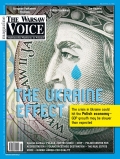

The Warsaw Voice | 24 kwiecień 2008

* Pokazana okładka tytułu jest aktualną okładką tytułu The Warsaw Voice. Kiosk24.pl nie gwarantuje, że czytany artykuł pochodzi z numeru, którego okładka jest prezentowana.
Leading Polish politicians and delegations from Israel and elsewhere gathered in Warsaw April 15 to commemorate the 65th anniversary of the Warsaw Ghetto Uprising, in which the city's Jewish inhabitants fought their Nazi oppressors in a hopelessly lopsided last-ditch battle.
The anniversary was brought forward four days so as not to fall on the Jewish Sabbath. "The Warsaw Ghetto Uprising illustrates that people were determined to defend their dignity and honor in the face of brutal, totalitarian Nazi power," Polish President Lech Kaczyński said April 16 at a joint press conference with his Israeli counterpart Shimon Peres.
Both heads of state attended the official commemorations the day before. The main ceremony started with lighting candles at Warsaw's Monument to the Ghetto Heroes on the site of the former Umschlagplatz ("collection point" in German) from which Jews from the ghetto were deported 100 km northeast to the Treblinka death camp, and at the Remembrance Stone on what was once the Jewish Fighting Organization's command bunker. The bunker, on Miła Street, was where many of the ghetto insurgents, including leader Mordechaj Anielewicz, made their last stand.
"World War II witnessed a lot of heroic deeds," Kaczyński said. "But the Warsaw Ghetto Uprising stands out even amongst heroic deeds. The ghetto insurgents weren't fighting for victory but for honor. They resolved to fight in what was a hopeless situation. Living conditions in the ghetto are best summed up by the fact that 100,000 of the initial 450,000 people sent here died from hunger, disease and German oppression within a year," the president said, referring to the Nazis cramming 450,000 people into an area of less than four square kilometers in the spring of 1941. "Two clandestine organizations-the Jewish Fighting Organization and the Jewish Military Union-were formed in these hellish conditions," Kaczyński said.
The president reminded listeners that the ghetto had been a point of departure to death camps beginning spring 1942. "Every day, around 6,000 people were deported from the Umschlagplatz to extermination camps. The fate of Polish Jewish citizens deported from here was becoming increasingly obvious. These are the conditions in which the uprising broke out in April 1943," Kaczyński said.
"The ghetto insurgents fought bravely despite having no chance of victory," Peres said. "The fascists left future generations a legacy of shame, disgrace and devastation. Most of the insurgents died but history had never before witnessed a victory like this. The few had conscience, the many had guns and Satan." Peres said Jews had their "revenge" by setting up a Jewish state.
"After the Holocaust and wars, we longed for peace," he said. "A Jewish state which is a world leader in agriculture, medicine and modern technology has been established. This is our revenge."
Also present at the ceremonies were Polish Prime Minister Donald Tusk, lower house Speaker Bronisław Komorowski, Warsaw Mayor Hanna Gronkiewicz-Waltz, Poland's Foreign Minister Radosław Sikorski and France's Foreign Minister Bernard Kouchner, a U.S. government delegation, officials from various faiths, the Polish armed forces, the Warsaw authorities and from many other European cities, and young Poles and Israelis. Marek Edelman, the last surviving leader of the Warsaw Ghetto Uprising, was there as was Irena Sendler, the woman who saved an estimated 2,500 Jewish children from the ghetto by providing them hiding places and false documents. The participants honored the memory of the ghetto fallen with a roll call of the dead and the Jewish Kaddish prayer. The three field bishops of the Polish army, Catholic Tadeusz Płoski, Protestant Ryszard Borski and Orthodox Miron Chodakowski, read out an ecumenical prayer for the dead.
Wreaths were laid in tribute to those who lost their lives at the Monument to the Ghetto Heroes by surviving Warsaw Ghetto insurgents, the Polish and Israeli presidents, both houses of the Polish parliament, the Polish government, the diplomatic corps, the Polish armed forces, the governor of Mazovia province, the City of Warsaw, Jewish and war veteran organizations, mayors of Polish and other European cities, and Polish and Israeli school children.
The Warsaw Ghetto Uprising began on the eve of Passover, April 19, 1943 when German forces entered the ghetto with orders to take it down. Around 1,000 poorly armed insurgents died fighting more than 2,000 German soldiers, SS troops, Gestapo police, Ukrainian troops, and Latvian and Lithuanian auxiliary police.
The German forces had tanks and artillery at their disposal. The Jewish fighters received limited assistance from the Polish underground, which itself was poorly equipped compared to the Germans.
SS commander Jürgen Stroop declared the uprising suppressed May 16, although sporadic fighting continued into June, and ordered his troops to blow up the Great Synagogue on Tłomockie Street. Stroop's final report claimed that more than 56,000 Jews had been killed or captured.
Around 6,000 people died in the fighting or from the fires in the buildings the Germans had set alight to smoke them out. Around 7,000 people were killed in the ghetto and another 7,000 were sent to Treblinka. The remaining 36,000 or so were deported to other camps, mainly Auschwitz and Majdanek, where most of them perished.
Witold Żygulski
 Wróć do czytelni
Wróć do czytelni